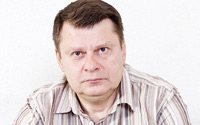Ниже я публикую сначала сам текст материала, опубликованного на первой полосе The Sunday Times, а потом и саму публикацию (размещу завтра).
Комментировать пока не буду.
AN EXTRAORDINARY covert operation has been mounted by Russian spies in Britain in an effort to frame an arch-critic of Vladimir Putin.
Secret agents from the Federal Security Service (FSB) launched the brazen plot in London and Surrey in an attempt to discredit Valery Morozov, who claimed political asylum in the UK after blowing the whistle on Kremlin corruption.
Acting under direction from Moscow, the intelligence officers posed as investors to try to entice the property magnate into a money-laundering scheme that would have «cleaned» £30m of dirty money generated by Russian organised-crime gangs. They also tried to donate €1.5m of Continued on page 2 uu Continued from page 1 counterfeit money to his anticorruption foundation in Britain, which would have left him open to criminal charges in the UKcourts.
Morozov realised that he was being framed by the FSB, pulled out of the deal and refused the donation. The news will raise new fears over Russia’s incursions in Britain at a time of heightened tension triggered by the Alexander Litvinenko inquiry. Last week the judicial probe into the murder of the spy in 2006 heard explosive claims that he was killed in an «act of nuclear terrorism» on the streets of London. Hours later, British Typhoon jets were scrambled to intercept two Russian bombers over the English Channel.
Morozov, a Communist party apparatchik, fled to Britain in 2012 after exposing a Kremlin bribery racket.
In London, Morozov, 60, set up the International Anti-Corruption Committee (IACC) to find the assets of corrupt Russian officials.
The project led to Morozov receiving a number of threats from Russia, which were reported to British police.
In the summer of 2012, FSB agents posed as Russian exiles interested in investing in the IACC to try to persuade Morozov to open a series of offshore trusts in Guernsey and Gibraltar, in order to receive around £30m to be channelled out of Russia. The money was to be invested in properties in London and Guildford, Surrey.
However, Morozov realised that his new Russian «friends» were trying to draw him into an unlawful moneylaundering operation. His suspicions grew when the Russians tried to donate €1.5m to the IACC — but the money turned out to be counterfeit.
«The British public may be shocked at all this, but I don’t think they know the reality of what goes on,» he said.
«I was not surprised this happened, I predicted it. The people who are against me in the Russian regime needed to disgrace me and ruin my name.»
